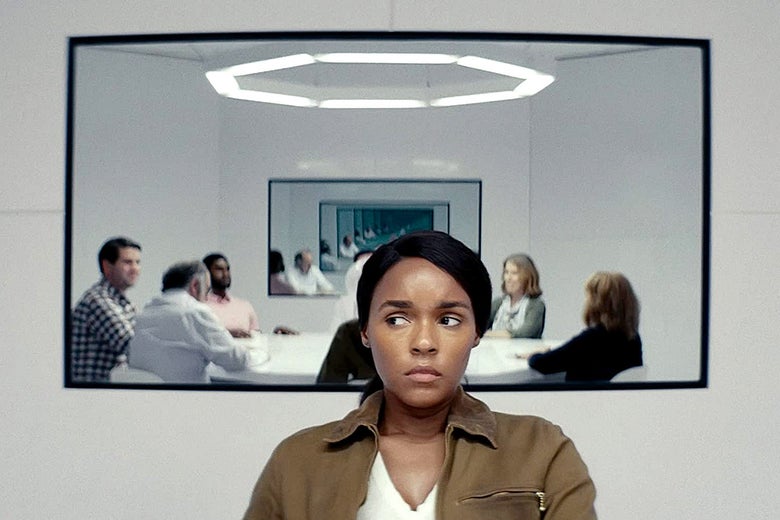
Janelle Monáe in Homecoming.
Amazon Studios
This article contains spoilers for Homecoming Season 2
Homecoming is a show about a drug that makes people forget, and for a while, it seems as if the second season’s plan is hoping that viewers have done the same. The first season, adapted by creators Eli Horowitz and Micah Bloomberg from their hit podcast, came to a conclusion that felt both open-ended and definitive. The story of a military veteran (Stephan James) whose mind had been nonconsensually wiped clean and a caseworker (Julia Roberts) who helped expose the government contractor who did it, the season wrapped up with the truth uncovered and the relationship between its main characters more or less resolved (to the extent that it can be when one person has been rendered chemically incapable of remembering the other). There was a brief, teasing scene involving Hong Chau as an executive at Geist, the company responsible for abusing the memory drug, but it felt like the beat at the end of a horror movie, less a setup for a sequel than one final scare before the credits finally roll.
At first, the second season appears to just be telling the first season’s story over again. We begin with Jackie (Janelle Monáe) awakening in a rowboat in the middle of a lake, a gash on her forehead and no memory of how she got there or even who she is. The closest thing she has as a clue to her identity is the “Death From Above” tattoo on her inner arm, a symbol of her time as an Army paratrooper. The first two episodes find her tracking down leads and making her way toward Geist, as Chau’s Audrey Temple continues the nefarious work of restarting the Homecoming program. As Audrey stages a party to celebrate the launch, Jackie stalks her way through the crowd, full of fury and seemingly on the edge of violence. Audrey sees her coming and starts striding toward her, as if she’s looking to head off trouble and keep Jackie from storming the stage. The music grows tense as the two near collision, but as Jackie opens her mouth to yell, Audrey stops it with a kiss. Huh?
The third episode, “Previously,” begins to explain what’s going on, although the story doesn’t fully catch up to that pivotal moment until the season is almost over. Jackie, we discover, is not an Army veteran—in fact, as the peeling tattoo on her forearm reveals, she’s not a veteran at all. She’s also not named Jackie. Her name is Alex, and she’s a crisis manager in a long-term relationship with Audrey. (Jackie is the name of their cat.) Moreover, as we soon learn from watching her talking a woman out of filing a sexual harassment claim, she’s usually on the wrong side of the crisis. Because she’s played by Janelle Monáe, we’re inherently drawn to Alex, and the season keeps us on her side as she, like Roberts in the first season, goes after the truth. But the truth she uncovers is that she’s the villain, or at least one of them.
The way the season tricks its audience into siding with the wrong character is its most intriguing trick.
The second season of Homecoming never entirely justifies its own existence. Kyle Patrick Alvarez, who takes over as the director of every episode, doesn’t have predecessor Sam Esmail’s visual flair or his sense of showmanship, and the season spends its music budget on securing Fleetwood Mac’s “Don’t Stop” for the balloon drop at Audrey’s big party rather than licensing dozens of conspiracy-thriller scores for its soundtrack. (That particular cue makes it seem like the season will be offering some commentary on the post-Clinton corruption of noble ideas, but that idea never jells.)
But the way it tricks its audience into siding with the wrong character is its best and most intriguing trick. It takes a few more episodes to learn the depths to which Alex is willing to sink, during which time we also see how Audrey’s ambitions to rise up the corporate ladder, previously thwarted because of her gender, her race, or both, lead her to forge a deal with the devil—the devil in this case being Joan Cusack’s gung-ho Department of Defense head. There’s something a little queasy, if seemingly unintentional, about the way the larger arc of the season pits ruthlessly ambitious, morally bankrupt women—Monáe, Chau, and Cusack—against righteous, upstanding men, including James’ character and Chris Cooper as Geist’s head and namesake, who wants the company to get out of the mind-altering business altogether. The women are thwarted if they play by the rules and thwarted if they break them. (In fairness, the pattern doesn’t hold all the way down: Bobby Cannavale and Alex Karpovsky return from the first season as some of Geist’s more weaselly employees.)
As we learn more about Alex and Audrey, we learn that they’re a happy cohabiting couple who are wrestling with the decision of whether to have children, which means their push toward greater financial stability isn’t just about self-interest. Of course, that’s how many people who wind up doing evil things make their way down the path: It’s for the kids, or their parents, or just because they think they deserve it. We don’t feel like Alex and Audrey are bad people, and they certainly don’t think of themselves that way, even as their actions stray further into the darkness. They get their comeuppance by the end of the season, and in a way that feels truly final, although the creators have said they have ideas for yet another season. But the justice that’s meted out feels both poetic and cruel, and, as at the end of the first season, like the real culprits might still be lingering just out of frame.
from Slate Magazine https://ift.tt/2ZzG51a
via IFTTT
沒有留言:
張貼留言